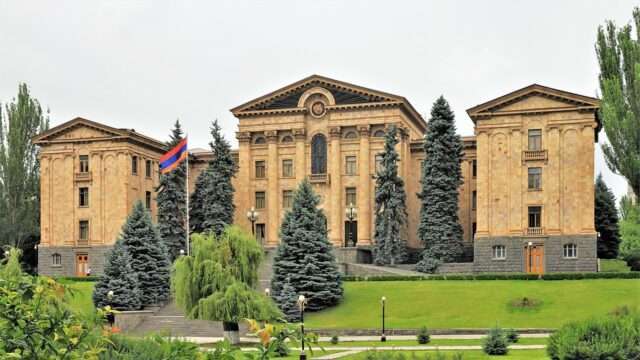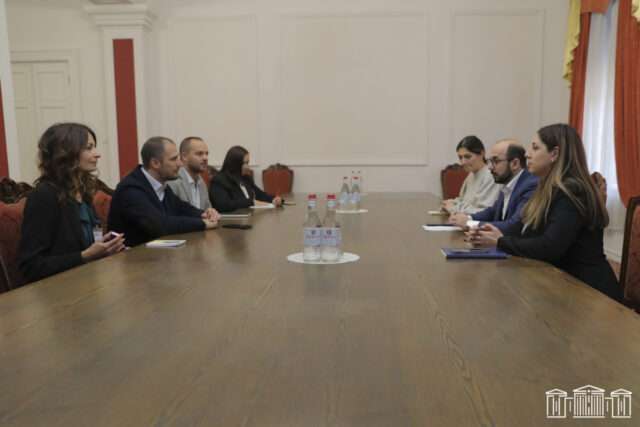
Geopolitical Report ISSN 2785-2598 Volume 24 Issue 9
Author: Silvia Boltuc
In 2018 the so-called Velvet Revolution marked the end of an era in Armenia which belonged to Serzh Sargsyan and gave the start to Pashinyan and Civil Contract leadership in the country. Just in four years, the new Armenian Government has faced the 2020 Nagorno-Karabakh War, the pandemic and the following economic problems that have affected the entire international systems, and Azerbajani military aggressions such as the last in September 2022.
On October 24th, 2022, during the official mission in Yerevan, SpecialEurasia met with Hripsime Grigoryan, a politician of the leading Civil Contract party and faction and a member of the National Assembly of the Republic of Armenia, and Artur Hovhannisyan, the Secretary of the Civil Contract faction and a member of the National Assembly of the Republic of Armenia, to investigate current Government’s domestic politics and assess the national situation.
During our discussion, Artur Hovhannisyan stressed that “after the 2020 Artsakh war, the Government decided to resign – give power again to the people of Armenia. This was again to state that Armenia is a democratic country. From inside Armenia, the situation is more in balance. Of course, we have problems with the opposition, but we try to gather all our efforts to maintain the security of our borders.
On September 13th, 2022, Azerbaijan again started an invasion of the sovereign territory of Armenia. Azerbaijan occupied some of Armenia’s territories, plus we had tens of thousands of prisoners of war, people lost, and 200 dead people.
During the 2021 elections, our first strategy was peace with Azerbaijan, which is still our approach. For us to keep the safety of the Armenian people living in Artsakh is a priority. Per Armenia-Azerbaijan relations, the only solution we see is in recognising of each others’ territories. We should also point out that Azerbaijan has made it very hard to go through the peace process, but Armenia is continuing its efforts. These days the EU civic mission and OSCE assessment group are in Armenia, monitoring the Armenia-Azerbaijan borders, and we evaluate this very positive and hope that this will help to prevent the aggressions from Azerbaigian.”.
September military escalation at the Armenian-Azerbaijani borders alarmed the international community, afraid that a strategic region such as the South Caucasus could have lived a conflict again. Since the beginning of the military aggression, different members of the European Parliament and the U.S. Government called for a ceasefire. At the same time, the Collective Security Treaty Organisation (CSTO) dealt with this event vaguely and timidly, causing great discontent in Armenia, which had effects in the latest CSTO military drills in which Yerevan did not participate.
This time the West seemed more involved in the regional peace process, especially after the United States House of Representatives speaker, Nancy Pelosi, visited Yerevan at the end of September 2022. The attention that the international community has in stabilising the South Caucasus and avoiding any further military aggression also reflects the OSCE decision to send a needs assessment team to the country on October 21-27, 2022, to assess the situation in certain border areas.
According to Hripsime Grigoryan, “it has just passed one month after the last aggression in which Armenia’s territories were occupied. What is very important is that this time the international community has addressed the issue, not in vague terms, but has clearly stressed out who is the aggressor and has condemned the occupation of the Armenian sovereign territories by Azerbaijan, and also call out Baku to withdraw immediately from the occupied territories.
A fundamental change we see is that the international community is evident in its position. Remarkably, the United States, the European Union, individual countries and organisations not only from the West spoke very clearly and directly. Unfortunately, the security block CSTO, which Amenia is a member of, has not effectively responded to Armenian’s request to assist a member state that has been attacked. We are still trying to understand the CSTO and Russia-specific positions on ongoing issues.
After the election, we receive a mandate to open an era of peace for Armenia and the region. The region is a centre of geopolitical conflict, and many actors have vital interests here. It is important to keep stability and peace, but it is also challenging. Our Government has been very active in promoting peace talks and peace processes with Azerbaijan and Turkey. Armenia and Turkey have appointed special representatives that have already met four times to discuss the normalisation of relations, and we are on our way to that. An essential aspect that both Turkey and Armenia have agreed on is the normalisation of relations without preconditions. Armenia-Turkey normalisation will help Yerevan-Ankara relations and be positive for the normalisation of Armenia-Azerbaijan.”.
Armenian foreign policy and the normalisation of relations with Turkey in a changing world
Normalising relations with Turkey is essential to change the last decades’ geopolitical balance and dynamics in the South Caucasus and allow Armenia to open one of its borders. In the past, Yerevan and Ankara vehemently argued because the Turkish authorities did not want to recognise the Armenian Genocide, which the Armenian side saw as essential to start a dialogue with the Turkish counterpart. – in fact, Armenian authorities have not put recognition of the Armenian Genocide as a precondition to normalization./
Hripsime Grigoryan explained that “although this issue is crucial for the Armenian people, it is also very hard to start the normalization with the most completed issues on the first place. Therefore, our Government preferred to start the normalisation with Turkey by concentrating on opening of the borders and establishing diplomatic relations.”. At the same time, Artur Hovhannisyan stressed that “the normalisation between Turkey and Armenia will also positively affect the relations between Yerevan and Baku”.
“Another vital topic is the corridors between the two parts of Azerbaijan through Armenia. Armenia rejectes the notion of so called “corridors” but is open to establishing transit roads. The aggression of the last September is an example of getting to a solution with the use of force, which is unacceptable, but we continue being devoted to a peace process.”
Undeniably, September military escalation aimed to achieve the goal of the so-called the Zangezur Corridor by force because the road project has become one of the most contentious issues between Armenia and Azerbaijan since the 2020 Nagorno-Karabakh Conflict. Since several actors are involved in the corridor area, Hripsime Grigoryan said, “we speak about deblocking of regional communications. The basis for talking about this is the November 9th, 2020, trilateral announcement. And the 9th point of this announcement, which Russia, Armenia and Azerbaijan signed, stated clearly that there would be a road connecting the eastern part of Azerbaijan to the autonomous region of Nakhichevan, and the road would go through Armenia.
We need to speak about this because, during the 90’s war, Azerbaijan unilaterally blocked Armenia from the eastern side and Turkey from the western side. So deblocking means lifting this blockade. But in recent decades, infrastructures such as railways or roads have been destroyed or deteriorated, and Armenia is ready to rebuild them under an agreement. There can be no conversation, and there are no legal bases for discussing an extraterritorial corridor.
Our international partners (the US, states of the EU, and Russia) also confirmed our position on this issue. They have stated the unacceptability of an extraterritorial corridor, and they noted that the regional infrastructures should be deblocked and any roads that will be involved will be under the sovereignty of the country they pass through. The organisation of cargo or passengers passing from one to another should be under the legislation of the country providing the passage.
Furthermore, the 9th point of the declaration affirms that the Russian Federal Security Forces (FSB) provide the security and overseeing of the passage before the final transformation of the conflict. Azerbaijan accepts the sovereignty of Armenia during official negotiations, but for their internal audience, both Turkey and Azerbaijan talk about extraterritorial connectivity.”.

On this issue, it should be stressed that when Armenia signed the agreement in November 2020, the world lived in a ‘different era’ which ended in February 2022 when, after the beginning of the Ukraine conflict, started a harsh confrontation between Russia and the West. Furthermore, during September military escalation, CSTO showed its limits since neither Kazakhstan nor Turkmenistan supported Armenia. Considering that now Turkey play a significant role in the South Caucasus and Azerbaijan has become a key strategic partner to the European Union in Brussels’ attempts to diversify its natural gas imports and decrease the dependence on Moscow, there are doubts that the international support which Armenia recently received might change in the following months, especially due to the results of the Ukraine conflict.
“I share your fear that international law might not work and that world order has been destroyed during the last year“, stated Hripsime Grigoryan, discussing this issue, “but I understand that we are talking about an authoritarian country (Azerbaijan) that several times showed disrespect towards international law, its principles, and the treaty that has been signed. We are not talking about Nagorno-Karabakh anymore in the case. We are talking about Armenia’s sovereign territories, an attack towards a UN member country, and we understand that another large-scale attack is possible.“.
Armenia’s Future: between peace talks and domestic reforms
On the one hand, on the international level, Armenia promotes peace talks and normalising relations with Turkey to guarantee regional security. On the other hand, the current Government is also involved in different reform processes inside the country to face socioeconomic problems and contrast corruption.
Indeed, as Hripsime Grigoryan stated, “everything starts with elections. When the people elect a free and democratic government, the reforms have substantial public support, even the most difficult ones. Our main effort is to bring reforms in sectors that are vital for Armenia: we have promoted judicial, electoral, media, education, defence, and tax system reforms. In all these spheres, we must improve the situation or even build or rebuild the sector due to the past.
We are constantly working in this field, but what is crucial for us is to be consistently democratic. We cannot talk about reforms if we do not have democracy and free elections and allow the Armenian citizens to vote for the people who should lead the country in these challenging times.
It is very important to know that, despite the judicial system has its problems, currently, it is separated from other branches of power. This means that the judicial system is now independent, and the Government cannot influence or pressure it. We can say the same for the Ombudsman office. Of course, these steps will take years, but we are on the right path.
We cannot forget the economic reforms as well because, at the moment, we do not have monopolies in Armenia. We cannot deny that there is corruption, but it is also true that there is no country that has zero corruption.”.
Hripsime Grigoryan’s words reflect the Government’s economic and fiscal policy based on establishing a market without corruption and monopolies and open to foreign direct investments (FIDs). A long path that the current Government under the leadership of Nikol Pashinyan started just four years ago, whose positive outcomes have been visible in the last couple of years since Armenia recovered from the pandemic and the following economic crisis, and Yerevan registered a good economic performance.
